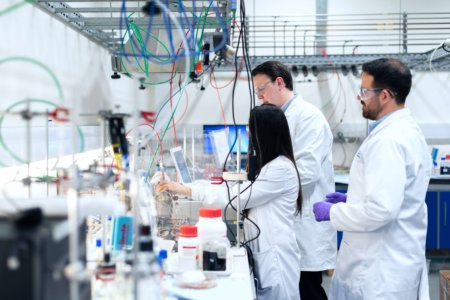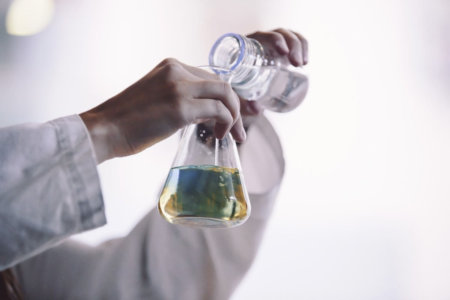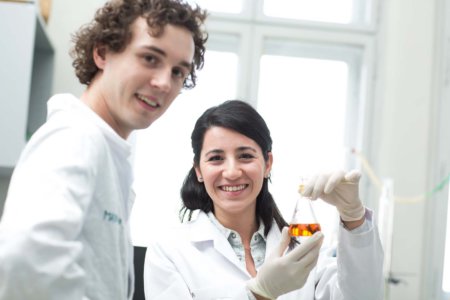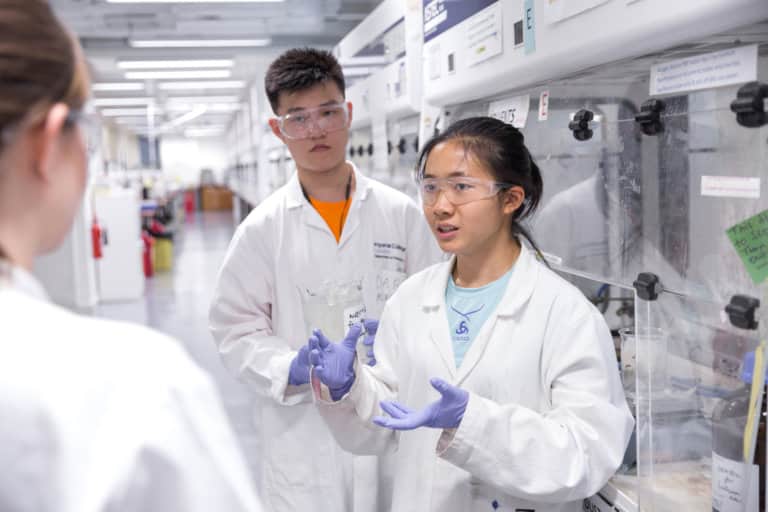
The study of chemistry is essential. Without it, we would not have polymers, certain plastics, advancements in renewable energy, fertilisers and pesticides, or even antibiotics. Instrumental in countless innovations, chemistry’s impact on multiple sectors highlights the importance of continued exploration and research in this field.
What this also shows is that chemistry graduates will hardly be limited to one industry, primarily because the subject provides a deep understanding of the fundamental principles that govern the composition, structure, and behaviour of matter — which makes up everything. There is a seemingly endless list of industries you can join with a chemistry degree, such as pharmaceutical and biotechnology, chemical manufacturing, environmental and energy, food and beverage, cosmetics and personal care, forensics, materials science, as well as academia and research.
To secure the best future in these fields, finding the right school to pursue a chemistry degree is crucial. The quality of education and resources available at a university significantly impact the learning experience. Top-tier institutions often have well-established chemistry departments with renowned professors, state-of-the-art laboratories, and ample research opportunities. Such an environment fosters intellectual growth, exposes students to cutting-edge advancements in the field, and enhances their understanding of complex concepts.
Here are three universities that are leading the charge with innovative chemistry degree programmes:
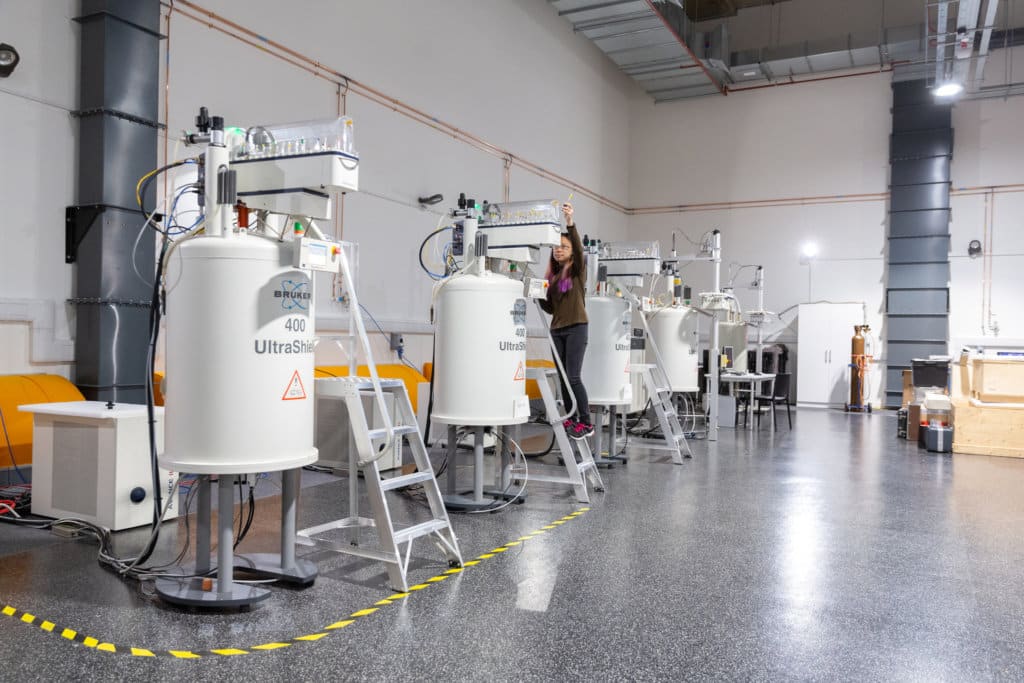
Students have access to state-of-the-art facilities at Imperial College London. Pictured: Nuclear Magnetic Resonance (NMR) Suite in the Molecular Sciences Research Hub (MSRH), White City Innovation Campus. Source: Imperial College London
Imperial College London
Imperial College London has a proven track record. It is ninth in Chemistry (QS World University Rankings by Subject 2023), third in the UK (Academic Ranking of World Universities 2021 for Chemistry) and third in Europe (THE World University Rankings 2022 for Chemistry). The 2021 Research Excellence Framework (REF21) results saw the department ranked as second and third respectively for research outputs according to the THE rankings and percentage of 4* research (defined as “world leading”) in the UK. The Department was also one of only four in the UK to achieve a score of 100% 4* for its research environment in REF21. Graduates do well — 95% of undergraduate students found work or are in further study within 15 months of graduation, which explains why the school is first in the UK for graduate prospects.
These achievements are as impressive as its campuses. Undergraduates spend their early years at the South Kensington campus. Research groups are based at the Molecular Sciences Research Hub (MSRH) in the heart of the new White City Campus – where you’ll find one of the most thriving SME and industry districts in Europe. From teaching and study spaces to computer rooms and laboratories, you’ll have an exceptional environment to study and conduct research in. Take for example, the MSRH. It’s worth 170 million British pounds and is one of the most advanced chemical facilities in the world with a capacity for 80 groups and over 800 researchers.
All degrees are fully accredited by the Royal Society of Chemistry (RSC) and reflect Imperial’s Gold award in the Teaching Excellence Framework (TEF). Innovative and broad, what you learn here will expand what you know, make you confident in data analysis, coding and problem solving – all while preparing you for your future career.
From interfacing with the SME ecosystem at White City through to summer placements opportunities, there are undergraduate programmes that include a year working in industry, such as MSci Chemistry with Medicinal Chemistry, BSc Chemistry with Management, and MSci Chemistry with Research Abroad and a Year in Industry.
To study here is to be part of a community where everyone is welcome to excel too. The department won an Athena Swan Gold Award in 2013 (renewed 2019) for their commitment to gender equality in the sciences. The culture is always positive, thanks to many student events organised by the Chemistry Society, academic and welfare student representatives, personal and year tutors, a pastoral support system, and a departmental Equality, Diversity and Inclusivity committee.
UC Berkeley

UC Berkeley has a thriving start-up culture from which chemistry students can benefit. Source: UC Berkeley
Focused on advancing society through education and research, UC Berkeley’s College of Chemistry includes departments of Chemistry — which produces leaders in analytical, inorganic, organic, nuclear, physical and theoretical chemistry — and Chemical and Biomolecular Engineering, housing premier research programmes in molecular thermodynamics, heterogeneous catalysis, electrochemical engineering, biochemical engineering, and separation processes.
The US News and World Report named UC Berkeley as the number one university in the world for chemistry. While the college is proud of being the home to many Nobel Laureates, including David W.C. MacMillan (2021) and Carolyn Bertozzi (2022), who are part of the faculty, as well as alumni Ahmed Zewail (Postdoc ’74), KurtWuthrich (Postdoc ’67), and Frances Arnold (PhD ’85).
Students can choose from six undergraduate degrees, which include a joint major in Chemical Engineering and Materials Science or Chemical Engineering and Nuclear Engineering and five graduate degrees.
The BS in Chemistry provides a thorough fundamental knowledge of the major fields of chemistry, covering the general areas of inorganic, organic, and physical chemistry, plus many more specialised courses including analytical, nuclear, and biophysical chemistry and chemical biology. It includes plenty of laboratory experience in inorganic and organic synthesis, analytical methods, physical chemical measurements, spectroscopy, biochemical engineering, and chemical methods in nuclear technology. Those interested in the discovery, design, and characterisation of materials can join the Materials Chemistry concentration.
With research buildings that operate 24 hours a day, the facilities at the university are top-notch. There are many specialised labs on campus and at the Lawrence Berkeley National Laboratory (LBL), as well as high-tech equipment such as particle accelerators and high-energy X-ray light sources available. With the help of the US Department of Energy, private sector partners, and LBL, the college has developed the world’s most advanced cluster of research centres on biofuels and artificial photosynthesis.
Ariel Wang, Chemical Biology major, is engaged in two research labs on campus — the Ting Xu lab and John Dueber lab. “It is very interesting to see the intersection of different fields, especially since the research in the Xu group is very diverse. I work with computational chemists, synthetic chemists — who are very good at making molecules — and experts who are good at developing new ways to do catalysis of a material we are making,” she says. “I get to see what happens when different people with different backgrounds and training come together. The ideas that can spark from that are fascinating.”
There is also an online programme: Master of Molecular Science and Software Engineering, which is focused on teaching scientists to use computation and machine learning to solve real-world problems in the molecular sciences and beyond. It’s taught fully online or partially online with two on-campus bootcamps. This lets students balance work and life commitments while getting a Berkeley-quality education from anywhere in the world.
ETH Zürich

About 50% of all doctoral chemistry students in Switzerland are educated at ETH Zürich’s D-CHAB. Source: ETH Zürich
ETH Zürich’s Department of Chemistry and Applied Biosciences (D-CHAB) began as one of the original six “Abteilungen” at ETH’s inception in 1855. Now it boasts an international faculty of 50 professors training 1,800 students and postdoctoral fellows hailing from over 26 countries.
And it’s home to its fair share of Nobel Laureates too. Out of a total of 21 awards to researchers who have or had a connection with ETH Zurich, 10 Nobel Prizes were awarded to the field of chemistry. Kurt Wüthrich was one of them. He won the coveted award in 2002 “for his development of nuclear magnetic resonance spectroscopy to determine the three-dimensional structure of biological macromolecules in solution” (together with John B. Fenn, John B. Fenn, Virginia Commonwealth University, Richmond, USA, and Koichi Tanaka Shimadzu Corp., Kyoto, Japan).
As one of the university’s largest departments, D-CHAB has five institutes and laboratories, which represent all areas of fundamental and applied research in chemistry and applied biosciences.
These are spaces with some of the finest research and teaching facilities. For instance, the Institute for Chemical and Bioengineering (ICB) includes an Electronics Workshop and the High-Pressure Laboratory, and those in the Institute of Pharmaceutical Sciences (IPW) have full access to a variety of state-of-the-art core facilities that are continuously updated, such as Microscopy, imaging and histology; chemical libraries; and PET Imaging Centre.
The cutting-edge technology and exciting research at ETH Zürich have not gone unnoticed. The latest QS World University Ranking by subject ranks Chemical Engineering at this university seventh worldwide. In D-CHAB, students can undertake a selection of programmes, including BSc and MSc Chemistry; BSc Chemical Engineering and MSc in Chemical and Bioengineering; BSc Biochemistry – Chemical Biology and MSc as of fall 2023; BSc and MSc Interdisciplinary Sciences; BSc and MSc Pharmaceutical Sciences; and MSc Pharmacy.
There is also a broad selection of postgraduate programmes. The MSc Chemistry includes one compulsory subject each in the fields of inorganic, organic and physical chemistry and an extensive research projects and master’s (which can be replaced with an internship in industry. Students can choose from a long list of electives as well, which includes “Economics and Technology Management” to promote competences in the field of economy, leadership, coaching and project management.
About 50% of all doctoral chemistry students in Switzerland are educated at the D-CHAB. These programmes attract over 500 highly qualified doctoral students from all over the globe, and their research is in over 50 groups spanning several areas in chemistry, pharmaceutical and applied sciences.
*Some of the institutions featured in this article are commercial partners of Study International








